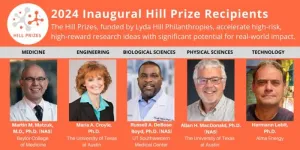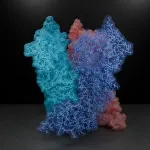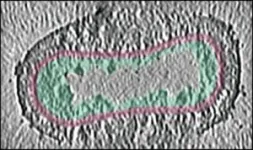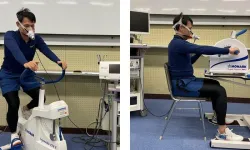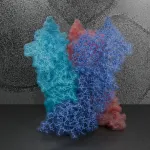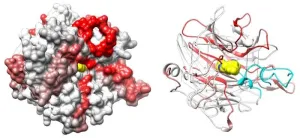(Press-News.org) Hill Prize in Medicine Awarded to Martin M. Matzuk, M.D., Ph.D. (NAS), Baylor College of Medicine
Hill Prize in Engineering Awarded to Maria A. Croyle, Ph.D., The University of Texas at Austin
Hill Prize in Biological Sciences Awarded to Russell A. DeBose-Boyd, Ph.D. (NAS), UT Southwestern Medical Center
Hill Prize in Physical Sciences Awarded to Allan H. MacDonald, Ph.D. (NAS), The University of Texas at Austin
Hill Prize in Technology Awarded to Hermann Lebit, Ph.D., Alma Energy
February 5, 2024 – Austin – TAMEST (Texas Academy of Medicine, Engineering, Science and Technology) and Lyda Hill Philanthropies today announced the recipients of the 2024 Hill Prizes. The prizes, funded by Lyda Hill Philanthropies, accelerate high-risk, high-reward research ideas with significant potential for real-world impact.
The prizes are given in five categories: Medicine, Engineering, Biological Sciences, Physical Sciences and Technology. They recognize exceptional innovators by providing seed funding to advance groundbreaking science and highlight Texas as a premier destination for world-class research.
The prizes aim to bridge the path from research to business development and further innovations that need additional funding for greater impact. A committee of TAMEST members (Texas-based members of the National Academies) selected the recipients, and finalists were endorsed by a committee of Texas Nobel and Breakthrough Prize Laureates and approved by the TAMEST Board of Directors.
Principal Investigators of the winning proposals will be recognized this evening, February 5, 2024, at the opening reception of the TAMEST 2024 Annual Conference in Austin, Texas. Each of the five winning proposals will receive $500,000 in funding from Lyda Hill Philanthropies to accelerate their work.
The Principal Investigators of the winning proposals are:
Medicine: Martin M. Matzuk, M.D., Ph.D. (NAS), Director of the Center for Drug Discovery and Chair, Stuart A. Wallace Chair, Robert L. Moody, Sr. Chair, and Professor in the Department of Pathology & Immunology at Baylor College of Medicine. His team’s proposal was chosen for the 2024 Hill Prize in Medicine for creating a novel approach to treat endometriosis. The debilitating chronic disease, which afflicts 190 million women globally and has no effective treatment currently, occurs when tissue similar to the lining of the uterus grows outside of the uterus and causes severe pain and inflammation in the pelvis. Endometriosis makes it more difficult to get pregnant and has challenging side effects. Dr. Matzuk’s team has identified a new therapeutic approach to relieve the pain and cause the endometriotic tissue to shrink as well. His team has used this research to find several potential drug candidates and will use the prize funding to perform preclinical development studies to create first-in-class non-steroidal drugs to treat endometriosis.
Engineering: Maria A. Croyle, Ph.D., Professor of Pharmaceutics at The University of Texas at Austin College of Pharmacy. Her team’s proposal was chosen for the 2024 Hill Prize in Engineering for demonstrating innovative techniques that will allow vaccines and biological drugs to be transported without the need for temperature control, which could lead to the rapid global distribution of life-saving medicines. Using methods from virology, immunology and drug delivery, Dr. Croyle’s team developed a simple, resource-sparing system to preserve vaccines so they can be shipped worldwide without the need for ice or to be kept at a specific temperature. Her team’s work has advanced to the point that a company has been created to bring the technology to the marketplace. Dr. Croyle’s team will use prize funding to advance the product to full scale production, allowing for the innovation to move from the lab to the clinic and have a profound impact in the developing world.
Biological Sciences: Russell A. DeBose-Boyd, Ph.D. (NAS), Beatrice and Miguel Elias Distinguished Chair in Biomedical Science and a Professor of Molecular Genetics at UT Southwestern Medical Center. Dr. DeBose-Boyd was chosen for the 2024 Hill Prize in Biological Sciences for his work’s potential to make statins more effective and provide insight into their side effects. Heart disease cases cause more than 600,000 deaths per year and more than 20 million Americans take statins daily. Dr. DeBose-Boyd’s research deploys an array of impressive tools including mouse genetics, biochemistry, screening and structural biology with the potential to develop a new class of statin enhancer drugs and improve our understanding of statins’ side effects. He will use the prize funding to advance his studies and provide for genetically-modified mice studies.
Physical Sciences: Allan H. MacDonald, Ph.D. (NAS), Professor and Director of the Center for Complex Quantum Systems in the Department of Physics at The University of Texas at Austin. His team’s proposal was chosen for the 2024 Hill Prize in Physical Sciences for its potential to create a new energy storage device, the quantum supercapacitor, a new, low-carbon way to store energy. If successful, this work would create a new energy storage technology with longer lifetime and faster charging speeds. Dr. MacDonald and his team will utilize prize funding to advance their ongoing research and probe the performance limits of quantum supercapacitors.
Technology: Hermann Lebit, Ph.D., Founder and Principal of Alma Energy. His team’s proposal was chosen for the 2024 Hill Prize in Technology for developing clean, emission-free direct lithium extraction using geothermal energy. His team partners with researchers at The University of Texas at El Paso to use resources within Texas to extract lithium (used for car batteries), hydrogen (used in the petrochemical industry) and fresh water, while sequestering the carbon during the process. His team will utilize prize funding to advance the technology to field testing, secure pilot project sites and complete water sampling procedures.
“Our organization is committed to funding game-changing advances in science and nature and that is exactly what the Hill Prizes’ mission is,” said Lyda Hill, Entrepreneur and Founder of Lyda Hill Philanthropies. “We hope that the funding awarded to these Texas scientists will help enable them to launch their pivotal research into development and continue to make advancements in scientific innovation.”
“We are thrilled to announce this year’s recipients of our Hill Prizes and to support these top researchers in our state as we watch them change the world,” said TAMEST President Brendan Lee, M.D., Ph.D. (NAM), Baylor College of Medicine. “These prizes will accelerate their groundbreaking contributions and put them in a stronger position to receive more research funding in large-scale grants and collaborations. We are proud to advance these exceptional innovators and ideas and highlight the most exciting research in the state thanks to the vision and support of Lyda Hill.”
“We had an astonishing amount of interest for our inaugural year of the Hill Prizes, which truly showcases not only the groundbreaking research happening in our state but the vital need to support and fund high-impact research in Texas,” said 2024 Hill Prizes Committee Chair David E. Daniel, Ph.D. (NAE), The University of Texas at Dallas. “The real work came from our volunteer subcommittees, who reviewed more than 160 applications and had the difficult task of selecting five proposals for funding. Their hard work paid off, and we are proud to put forward these five diverse and truly innovative research proposals to advance with the support of Lyda Hill Philanthropies. We can’t wait to see the results of this commitment in the years to come.”
Each recipient will submit an annual impact report to TAMEST and Lyda Hill Philanthropies to showcase their progress and highlight how the prize has accelerated their research.
After an incredibly successful first year of the prizes, Lyda Hill Philanthropies has committed over $10 million in funding to continue the prize program for the next three years. The $10 million will include the addition of a new prize in the category of Public Health, resulting in six prizes per year of $500,000 each. In addition, at least $1 million in discretionary research funding will be allocated by Lyda Hill Philanthropies on an ad hoc basis to highly ranked applicants and finalists not selected as recipients.
Applications for the 2025 Hill Prizes will open May 1 and close May 31, 2024.
Visit www.tamest.org/hill-prizes for more information on the prizes, application and selection process. TAMEST thanks the Hill Prizes Committee for their work selecting the 2024 recipients. Learn more about the committee members here.
About Lyda Hill Philanthropies:
Lyda Hill Philanthropies encompasses the charitable giving for founder Lyda Hill and includes her foundation and personal philanthropy. Her organization is committed to funding transformational advances in science and nature, empowering nonprofit organizations and improving the Texas and Colorado communities. Because Miss Hill has a fervent belief that “science is the answer” to many of life’s most challenging issues, she has chosen to donate the entirety of her estate to philanthropy and scientific research.
About TAMEST:
TAMEST (Texas Academy of Medicine, Engineering, Science and Technology) was co-founded in 2004 by the Honorable Kay Bailey Hutchison and Nobel Laureates Michael S. Brown, M.D., and Richard E. Smalley, Ph.D. With more than 335 members, 8 Nobel Laureates and 22 member institutions, TAMEST is composed of the Texas-based members of the three National Academies (National Academy of Medicine, National Academy of Engineering and National Academy of Sciences) and other honorific organizations. TAMEST brings together the state’s brightest minds in medicine, engineering, science and technology to foster collaboration, and to advance research, innovation and business in Texas.
TAMEST’s unique interdisciplinary model has become an effective recruitment tool for top research and development centers across Texas. Since their founding, more than 275 TAMEST members have been inducted into the National Academies or relocated to Texas.
END
Winners of the 2024 Hill Prizes announced
$2.5 million awarded by Lyda Hill philanthropies to Texas researchers to accelerate high-risk, high-impact ideas
2024-02-05
ELSE PRESS RELEASES FROM THIS DATE:
Beyond the pedals: testing upper limb feasibility of cardiopulmonary exercise testing
2024-02-05
How can inclusivity be achieved in cardiopulmonary exercise tests for individuals facing lower limb injuries or disabilities that make it impossible to pedal a bicycle? Conventional exercise assessments rely primarily on lower limb exercise to determine maximal oxygen uptake – a cardiopulmonary function metric that indicates the maximum amount of oxygen that can be taken into the body in one minute. If lower limbs cannot be exercised, it necessitates an upper limb alternative. However, no clear upper limb ...
Making drug use less dangerous for users is the only way to tackle overdose epidemic
2024-02-05
With more than 100,000 drug overdose deaths in the United States in one year, communities need more than ‘just say no’ drug prevention education and abstinence-only addiction treatment to save lives, an expert has warned.
Statistics show that most people who complete conventional drug prevention education as youth eventually go on to use alcohol, nicotine, or illegal drugs.
Harm reduction expert Sheila P. Vakharia, PhD, MSW, explains: “The majority have experimented, others use socially, and some experience substance-related problems or addictions. And, regardless of their patterns of use, most have never been taught strategies for safer substance use, ...
Veterinary drug newly found in illicit opioid supply resistant to naloxone
2024-02-05
An article published in CMAJ (Canadian Medical Association Journal) describes five things clinicians and harm reduction workers should know about xylazine, a veterinary medication adulterating the illicit opioid supplyhttps://www.cmaj.ca/lookup/doi/10.1503/cmaj.231603.
There is no antidote to the effects of xylazine, and the authors explain that xylazine contamination should be suspected when naloxone appears not to work effectively in people with opioid toxicity.
Highlights:
Xylazine is not approved for use in humans and is increasingly found in illicit drug samples along with fentanyl. People using ...
Difficulty swallowing, allergies in children and young adults: is it eosinophilic esophagitis?
2024-02-05
Children and young adults with allergies or eczema who have difficulty swallowing may have eosinophilic esophagitis. A review published in CMAJ (Canadian Medical Association Journal) provides guidance on how to diagnose and manage this chronic inflammatory disease https://www.cmaj.ca/lookup/doi/10.1503/cmaj.230378.
In people with eosinophilic esophagitis, the esophageal lining is inflamed, which can cause injury and narrowing of the throat. Although it can affect anyone, the risk is higher in children aged 5–14 years ...
Down to the core of poxviruses
2024-02-05
A recent re-emergence and outbreak of Mpox brought poxviruses back as a public health threat, underlining an important knowledge gap at their core. Now, a team of researchers from the Institute of Science and Technology Austria (ISTA) lifted the mysteries of poxviral core architecture by combining various cryo-electron microscopy techniques with molecular modeling. The findings, published in Nature Structural & Molecular Biology, could facilitate future research on therapeutics targeting the poxvirus core.
Variola virus, the most notorious poxvirus and one of the deadliest viruses to have ...
New weight loss medication may help lower blood pressure in adults with obesity
2024-02-05
Research Highlights:
The weight loss medication tirzepatide significantly lowered the systolic blood pressure of nearly 500 adults who had obesity and took the medication for 36 weeks, or about eight months, in a subset of an international clinical trial.
Participants taking 5 mg of tirzepatide had an average systolic blood pressure reduction of 7.4 mm Hg; participants taking 10 mg had an average systolic blood pressure reduction of 10.6 mm Hg; and participants taking 15 mg had an average systolic blood pressure reduction of 8.0 mm Hg.
In this study, the blood-pressure lowering effects of tirzepatide were evident during both day and night ...
Study finds new treatment to reverse inflammation and arterial blockages in rheumatoid arthritis
2024-02-05
UNDER STRICT EMBARGO UNTIL 10AM (UK TIME) ON MONDAY 5 FEBRUARY 2024
Researchers from Queen Mary University of London have found that the molecule RvT4 enhances the body’s natural defences against atherosclerosis (hardening of the arteries) in patients with rheumatoid arthritis.
Studies in mice undertaken by researchers from Queen Mary University of London’s William Harvey Research Institute and Centre for Inflammation and Therapeutic Innovation, and funded by the European Research Council (ERC) and Barts Charity, shows that increasing levels of the RvT4 molecule in the body improves the ability of the body’s own defence ...
Improving climate predictions by unlocking the secrets of soil microbes
2024-02-05
Climate models are essential to predicting and addressing climate change, but can fail to adequately represent soil microbes, a critical player in ecosystem soil carbon sequestration that affects the global carbon cycle. A team of scientists led by the Department of Energy’s Lawrence Berkeley National Laboratory (Berkeley Lab) has developed a new model that incorporates genetic information from microbes. This new model enables the scientists to better understand how certain soil microbes efficiently store carbon supplied by plant ...
City of Hope preclinical study uncovers two proteins’ crucial role in causing cancer cell growth
2024-02-05
FINDINGS
Scientists at City of Hope®, one of the largest cancer research and treatment organizations in the United States, have discovered a new cellular mechanism that plays an important role in cancer cells’ ability to cause disease. The study was published in Nature Structural & Molecular Biology today.
A team led by Chun-Wei (David) Chen, Ph.D., an associate professor of systems biology at City of Hope, pinpointed two cell-surface proteins, integrin αV and β5, that partner to spur cancer cell growth. The researchers next identified a region of integrin αV called the β-propeller domain ...
Immune response, not acute viral infections, responsible for neurological damage, McMaster researchers discover
2024-02-05
For years, there has been a long-held belief that acute viral infections like Zika or COVID-19 are directly responsible for neurological damage, but researchers from McMaster University have now discovered that it’s the immune system’s response that is behind it.
The research, published on Feb. 5, 2024 in Nature Communications, was led by Elizabeth Balint, a PhD student at McMaster, and Ali Ashkar, a professor with the Department of Medicine and the Canada Research Chair in Natural Immunity and NK Cell Function.
“We were interested in trying to ...
LAST 30 PRESS RELEASES:
A biological material that becomes stronger when wet could replace plastics
Glacial feast: Seals caught closer to glaciers had fuller stomachs
Get the picture? High-tech, low-cost lens focuses on global consumer markets
Antimicrobial resistance in foodborne bacteria remains a public health concern in Europe
Safer batteries for storing energy at massive scale
How can you rescue a “kidnapped” robot? A new AI system helps the robot regain its sense of location in dynamic, ever-changing environments
Brainwaves of mothers and children synchronize when playing together – even in an acquired language
A holiday to better recovery
Cal Poly’s fifth Climate Solutions Now conference to take place Feb. 23-27
Mask-wearing during COVID-19 linked to reduced air pollution–triggered heart attack risk in Japan
Achieving cross-coupling reactions of fatty amide reduction radicals via iridium-photorelay catalysis and other strategies
Shorter may be sweeter: Study finds 15-second health ads can curb junk food cravings
Family relationships identified in Stone Age graves on Gotland
Effectiveness of exercise to ease osteoarthritis symptoms likely minimal and transient
Cost of copper must rise double to meet basic copper needs
A gel for wounds that won’t heal
Iron, carbon, and the art of toxic cleanup
Organic soil amendments work together to help sandy soils hold water longer, study finds
Hidden carbon in mangrove soils may play a larger role in climate regulation than previously thought
Weight-loss wonder pills prompt scrutiny of key ingredient
Nonprofit leader Diane Dodge to receive 2026 Penn Nursing Renfield Foundation Award for Global Women’s Health
Maternal smoking during pregnancy may be linked to higher blood pressure in children, NIH study finds
New Lund model aims to shorten the path to life-saving cell and gene therapies
Researchers create ultra-stretchable, liquid-repellent materials via laser ablation
Combining AI with OCT shows potential for detecting lipid-rich plaques in coronary arteries
SeaCast revolutionizes Mediterranean Sea forecasting with AI-powered speed and accuracy
JMIR Publications’ JMIR Bioinformatics and Biotechnology invites submissions on Bridging Data, AI, and Innovation to Transform Health
Honey bees navigate more precisely than previously thought
Air pollution may directly contribute to Alzheimer’s disease
Study finds early imaging after pediatric UTIs may do more harm than good
[Press-News.org] Winners of the 2024 Hill Prizes announced$2.5 million awarded by Lyda Hill philanthropies to Texas researchers to accelerate high-risk, high-impact ideas
